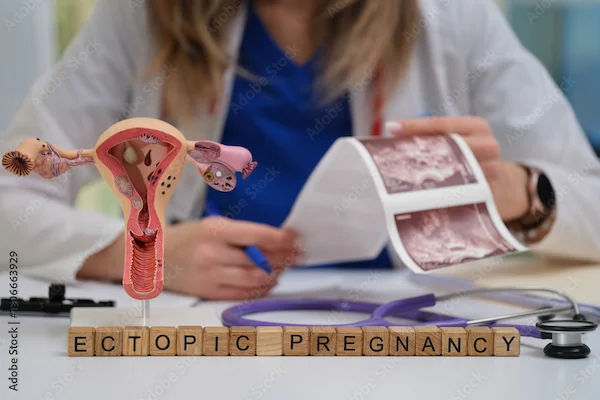Healthy Pregnancy with Higher BMI: Risks and Management
Learn how to manage a healthy pregnancy with a higher BMI. Understand the potential risks, medical guidance, and lifestyle tips for safer motherhood.

Written by Dr. Rohinipriyanka Pondugula
Reviewed by Dr. Vasanthasree Nair MBBS
Last updated on 13th Jan, 2026

Introduction
Navigating pregnancy is a journey filled with excitement and questions. If you have a higher Body Mass Index (BMI), you might have additional concerns and have encountered the term "high-risk pregnancy." It's crucial to understand that while obesity in pregnancy does come with increased health considerations, it doesn't define your journey. With the right information, a supportive healthcare team, and proactive habits, you can have a healthy pregnancy and a beautiful baby. This guide is designed to empower you with knowledge, offering an honest look at the potential risks and a practical action plan for managing them. We will cover everything from specialised prenatal care and nutrition to what you can expect during labour and postpartum. Think of this not as a list of limitations, but as a roadmap to taking control of your health for the well-being of both you and your child.
Understanding Obesity and Pregnancy: The Starting Point
Before diving into the specifics, it's helpful to have a clear, shared understanding of the medical terminology. This isn't about labels; it's about creating a baseline for the best possible care for you and your baby.
What BMI Means for You and Your Baby
Body Mass Index (BMI) is a screening tool that uses your height and weight to estimate body fat. For pregnancy, the categories are:
Overweight: BMI of 25.0 to 29.9
Obesity Class I: BMI of 30.0 to 34.9
Obesity Class II: BMI of 35.0 to 39.9
Obesity Class III: BMI of 40.0 or higher
Why does this matter? A higher BMI can influence how your body manages pregnancy. It can affect hormone regulation, increase inflammation, and put extra strain on your heart and joints. Understanding your BMI helps your healthcare provider tailor your prenatal care, such as recommending specific screenings or monitoring for conditions like gestational diabetes. It's a number that guides care, not a judgment on you as a mother.
The Importance of Preconception Counselling
If you're planning a pregnancy, one of the most powerful steps you can take is preconception counselling. This is a meeting with your doctor or an obstetrician to discuss your health before you conceive. For women with a higher BMI, this is especially valuable. During this visit, you can:
Review medications: Ensure any medications you're on are safe for pregnancy.
Start prenatal vitamins: Begin taking folic acid, which is crucial for preventing neural tube defects in the baby, and is often needed in higher doses for women with obesity.
Address underlying conditions: Manage existing issues like high blood pressure or thyroid problems.
Set realistic goals: Discuss healthy weight management strategies before pregnancy.
If you didn't have a chance for preconception counselling, don't worry. The next best time to start is as soon as you know you're pregnant.
Potential Risks: An Honest Look for an Empowered Journey
Knowledge is power. Being aware of potential risks allows you and your doctor to be proactive in monitoring and preventing them. Remember, an increased risk does not mean a certainty.
Health Risks for the Mother
Women with a higher BMI have a greater chance of developing certain pregnancy-related conditions.
Gestational Diabetes and Preeclampsia
Gestational Diabetes: This is a type of diabetes that develops during pregnancy. Obesity increases insulin resistance, making it harder for your body to regulate blood sugar. This can lead to a larger baby, which may complicate delivery. It also increases your risk of developing type 2 diabetes later in life.
Preeclampsia: This is a serious condition characterised by high blood pressure and signs of damage to another organ system, often the kidneys. It can be life-threatening if not managed. The risk of preeclampsia is significantly higher with obesity.
Sleep Apnoea and Heart Issues
Obesity can exacerbate or lead to sleep apnoea, a condition where breathing repeatedly stops and starts during sleep. This can reduce oxygen levels for both you and your baby. The extra weight also means your heart has to work harder, increasing the risk of cardiovascular strain.
Health Risks for the Baby
The mother's health directly impacts the baby's development and future health.
Birth Defects and Macrosomia
Research shows a correlation between obesity and a slightly increased risk of certain birth defects, including heart defects and neural tube defects (like spina bifida). This is why high-dose folic acid is so important. Macrosomia is the term for a baby that is significantly larger than average. This increases the risk of injuries during birth for both mother and baby and makes a Cesarean section (C-section) more likely.
Long-Term Health Considerations
Studies suggest that babies born to mothers with obesity may have a higher long-term risk of developing obesity and metabolic disorders themselves. This highlights the importance of a healthy pregnancy as the first gift of health you can give your child.
Consult a Foetal Medicine Specialist for the best advice
Your Action Plan: Prenatal Care and Healthy Habits
This is where you take the wheel. A higher-BMI pregnancy requires a specialised, proactive approach focused on health, not just weight.
Building Your Specialised Healthcare Team
You may benefit from care that goes beyond a standard obstetrician. Your team might include:
A Maternal-Foetal Medicine (MFM) Specialist: These are obstetricians with extra training in high-risk pregnancies.
A Registered Dietitian (RD): Essential for creating a personalised and sustainable diet plan for an obese pregnant woman that ensures proper nutrition without excessive weight gain.
A Physical Therapist: Can guide you on safe and effective exercise that accommodates your body and any joint pain.
Nutrition During Pregnancy: Eating for Two, Not Like Two
The old adage of "eating for two" is a myth. In the first trimester, you need no extra calories. In the second and third, you only need about 300-500 extra calories per day. The focus should be on quality:
Prioritise Protein: Lean meats, beans, lentils, and Greek yoghurt promote satiety and baby's growth.
Choose Complex Carbs: Whole grains, fruits, and vegetables provide steady energy and fiber.
Stay Hydrated: Water is crucial for all bodily functions and can help manage hunger.
Limit Processed Foods: These are high in empty calories, sugar, and unhealthy fats.
Safe and Effective Exercise for Every Trimester
Exercise is not only safe but highly recommended. It helps manage weight, reduces the risk of gestational diabetes, improves mood, and boosts energy.
Low-Impact is Key: Swimming, water aerobics, stationary cycling, and walking are excellent choices as they are easy on the joints.
Strength Training: Building muscle helps support your changing body and improves metabolism. Focus on light weights with high repetitions.
Listen to Your Body: The goal is to stay active, not to set personal records. Stop any activity that causes pain or dizziness.
Navigating Labour, Delivery, and Beyond
Your birth plan may need to be flexible, but that doesn't mean you can't have a positive experience.
What to Expect During Labour and Delivery
Women with obesity may face a higher likelihood of:
Induction of Labour: Often recommended if the pregnancy goes past the due date.
Longer Labour: The extra tissue in the birth canal can sometimes slow dilation.
C-Section: Due to factors like foetal size or labour not progressing. Recovery from a C-section can be more challenging with a higher BMI, requiring extra care for the incision site to prevent infection.
Postpartum Recovery and Your Health Future
The postpartum period is a critical time for healing and setting the stage for your future health.
Recovery: Take it slow. Accept help, and focus on resting, bonding with your baby, and nourishing your body.
Breastfeeding: Breastfeeding is absolutely possible and highly beneficial. It can also help with postpartum weight loss. Seek support from a lactation consultant if you face challenges.
Follow-up Care: Attend all your postpartum check-ups. This is the time to discuss birth control and long-term health goals. If you experience symptoms of postpartum depression that persist beyond two weeks, consult a doctor online with Apollo24|7 for further evaluation and support.
Conclusion
A pregnancy with a higher BMI requires careful attention and a proactive approach, but it is entirely possible to have a healthy and successful journey. The key lies in partnership with your healthcare providers, your support system, and yourself. By focusing on consistent prenatal care, mindful nutrition, and appropriate physical activity, you are taking powerful steps to mitigate risks and promote the well-being of both you and your baby. Remember, you are not alone in this. Countless women walk this path, and with the right resources and support, you can navigate it with confidence. This journey is about nurturing a new life while also making choices that honour your own health for years to come. If you have any concerns at any stage, from planning to postpartum, never hesitate to seek professional guidance.
Consult a Foetal Medicine Specialist for the best advice
Consult a Foetal Medicine Specialist for the best advice

Dr. Rupam Manna
Radiation Specialist Oncologist
7 Years • MBBS MD(RADIO THERAPY), CCEBDM
Barasat
Diab-Eat-Ease, Barasat

Dr. Sreeparna Roy
Obstetrician and Gynaecologist
8 Years • MBBS , MS (OBSTETRICS & GYNAECOLOGY), Fellowship in Infertility, Endoscopy & Ultrasonography), Fellowship in Laparoscopy & Hysteroscopy,DRM
Kolkata
Dr Utsa Basu Clinic, Kolkata

Dr. Revathi S Rajan
Obstetrician and Gynaecologist
24 Years • MBBS, DGO, DNB.FFMM
Bengaluru
Apollo Clinic, JP nagar, Bengaluru
Dr. Navin Srinivasan
Gynaecological Oncologist
9 Years • MBBS, MS DNB(OBS-GYNAE), MCH (GYNAE ONCOLOGY)
Bengaluru
Apollo Clinic Mahadevapura, Bengaluru

Dr Bhawna Garg
Gynaecological Oncologist
26 Years • MBBS, MS, (PGI MS ROHTAK) FELLOWSHIP GYNECOLOGY ONCOLOGY, (CANCER INSTITUTE CHENNAI)
Delhi
Apollo Hospitals Indraprastha, Delhi




